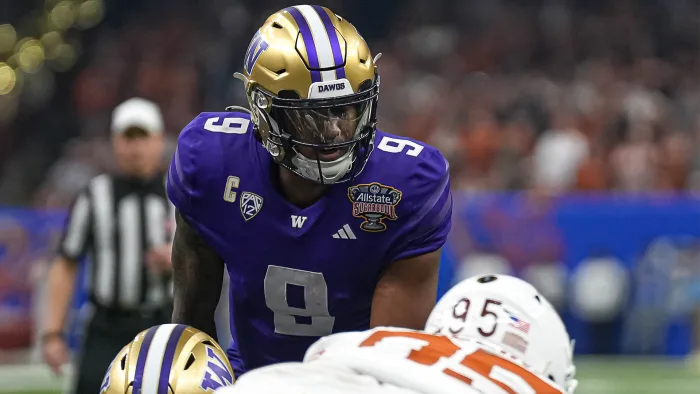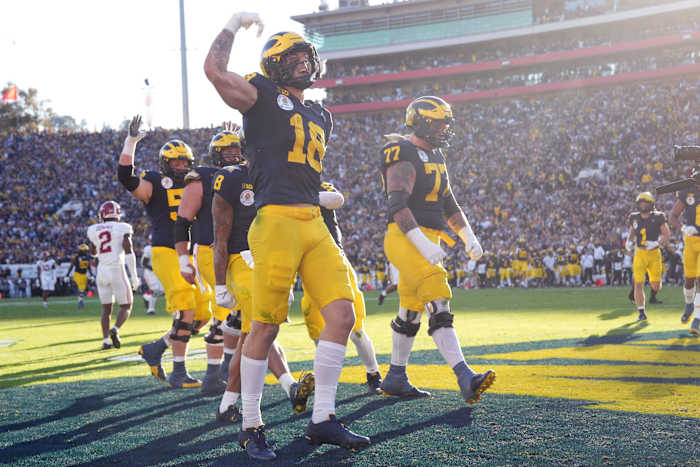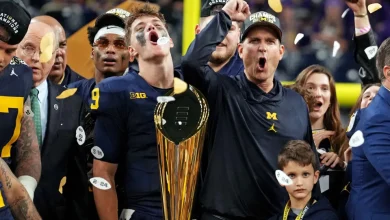Michigan and Washington’s Success Defies Recruiting Logic

The Wolverines and Huskies weren’t rated as having elite talent, but have managed to make it to the College Football Playoff’s championship game.
The Michigan Wolverines vs. Washington Huskies College Football Playoff championship game on Monday night is somewhat of a crisis for the recruiting industry. Huskies and Wolverines have no business being here. This is not logical.
This reality is largely at odds with the accepted algorithms for forecasting the caliber of recruits and the number of recruits each team will have. The players on Michigan’s and Washington’s rosters were considered good but not exceptional. They serve as a warning that hiring is difficult to quantify and uncertain.
Furthermore, these two groups could be early indicators of a change in the process of producing champions. The “stay old, get old”
method of roster building has taken over college basketball, and it could be coming to college football now as well.
Based on high school recruitment rankings, Michigan’s roster is ranked No. 14 in the US in the 247 Sports “team talent composite” for 2023. Washington is ranked No. 26. Every national winner since the team talent metric’s launch in 2015 at 247 Sports has been ranked in the top 10, and all but one (2016 Clemson) have been placed in the top six.
This season, Alabama, Georgia, and Ohio State—schools that have consistently dominated recruiting rankings in recent years—rank first, second, and third in the 247 Sports algorithm. Together, they have also earned 15 postseason invitations and six of the nine College Football Playoff championships. However, Monday night they will all be spectators.
In recent years, the recruiting outliers have become more and more prevalent. With a team skill ranking of 32, TCU upset the winner, Georgia, in the previous season’s championship game. By defeating a Michigan squad with a skill ranking of 13, the Horned Frogs advanced. Cincinnati appeared out of nowhere in 2021 with what was supposed to be the sport’s No. 54 roster (albeit nine players were ultimately selected). Michigan was placed fifteenth.
How then have the Huskies and Wolverines performed this season? a range of methods a perceptive eye for undervalued athletes;
an acumen for developing and utilizing them upon arrival on campus; retaining veterans who could have transferred or gone pro, but chose to stay in school for fourth, fifth and even sixth seasons thanks to the extra pandemic season of eligibility and/or NIL compensation; productive use of the transfer portal; and schematic coaching advantages.
The sixth-year players will be rinsed out of the system soon. But all the other elements remain in place for what could be the new paradigm of championship program building.
The NFL likes Washington’s talent on its way out much more than the recruiting services liked it on the way in. A team with zero five-star recruits and nearly twice as many three stars (49) as four stars (27) now has four players who are considered potential first-round NFL draft picks: quarterback Michael Penix Jr., wide receiver Rome Odunze, defensive end Bralen Trice and offensive tackle Troy Fautanu. None was a national Top 100 recruit according to either Rivals or 247.
Odunze was the highest-rated prospect of that group at No. 135 in the class of 2020, per 247, while Fautanu was No. 214 in the class of 2019. Trice (No. 612 in that class) and Penix (No. 1,113 in the class of 2018) were three-star prospects.
Odunze, Trice and Fautanu went to Washington and stuck out multiple coaching changes. Trice and Fautanu played their first season for Chris Petersen, then two lean years with successor Jimmy Lake, and the last two for Kalen DeBoer as part of a program renaissance. Odunze committed to Petersen and began his college career under Lake.
“There’s a lot of people that get reality checks really fast in college,” Fautanu said, and that included himself. After redshirting in 2019, he was exclusively a backup in ’20 and then started just three games in ’21. It wasn’t until DeBoer and his staff arrived that Fautanu was able to break into the starting lineup on a permanent basis.
Part of the reality check for the new Washington coaches in their first winter conditioning drills of 2022 was realizing how much talent they were inheriting—regardless of recruiting rankings—and starting with the offensive line.
“I can remember talking with (offensive coordinator) Ryan Grubb and watching the offensive line and being like, ‘Man, these guys are athletic and they’re huge,’“ DeBoer recalled. “We’re like, ‘How can we not have success with these guys out here on this roster?’”
They needed one thing to bring it together: a quarterback. That’s where the portal provided Penix, who had flourished at Indiana with DeBoer as his offensive coordinator and then languished through injuries and a crisis of confidence after DeBoer departed to be the head coach at Fresno State. When he showed up in Seattle in 2022, Washington had all the pieces for an 11-2 breakthrough season.
And then almost all those pieces came back for a run at a national title in ’23. Penix and his receivers—Odunze, Ja’Lynn Polk, Jalen McMillan—could have gone pro and been drafted, but not as high as they will be now. Same with Fautanu, who said he got a third-round draft grade last season. NIL opportunities weren’t the overriding factor, but they helped make the decisions a little easier.
Washington added one more key offensive piece via the portal for this season in running back Dillon Johnson, who arrived from Mississippi State. (That pickup that became vital when Cameron Davis, a career 900-yard rusher,
was sidelined for the entire season due to a preseason injury.) Johnson called his new Washington club “loaded,” and the coaches there nodded in agreement.
Grubb was so confident in his team’s ability to win the national championship that he considered declaring it as their preseason objective. He thought of a great idea: every Sunday meeting should begin with a projection slide showing the CFP trophy and a countdown to Monday, January 8, the day of the championship game. Grubb brought up the notion with former Washington coach Chris Petersen, who expressed worry that the Huskies would need to alter their approach if they lost.
Grubb considered it and decided what to do.
“Screw it, we’re going for it,” he said, opting to use the countdown. “Like fourth-and-1 in the Apple Cup, right?”
That was the final part of taking good to great at Washington. They had talented players who had developed and improved. They kept the nucleus around, becoming older and wiser. And they empowered them with a fearless approach to the game.
Nothing illustrated that more than the Grubb/DeBoer collaborative decision to go for the fourth-and-1 at their own 29-yard line with 1:14 left in a tie game with rival Washington State. The Huskies were 11-0 at that point with a season’s worth of dreams on the line. The conventional coaching wisdom screamed to punt the ball and play defense, because coming up short would immediately put the Cougars in range for the winning field goal. But Grubb wanted to go for it and DeBoer signed off.
Grubb didn’t just call a dive into the line of scrimmage. He called a jet sweep to Odunze off a fake by Penix, a jaw-dropping gamble that resulted in a 23-yard gain. A few plays later Washington kicked the winning field goal to
maintain its championship trajectory. A squad consisting of nine sixth-year players is poised to win a title six weeks later.
Although Michigan’s recruiting class is ranked better than Washington’s, it is still lower than those of the best teams, especially Ohio State, their bitter rival, and Alabama, the club the Wolverines defeated in the Rose Bowl to advance. Following that victory, some Michigan players made exaggerated claims that their team was made up of “no-star recruits,” which isn’t accurate given that the Wolverines have 45 four-star players, 38 three-star players, and two five-star players in junior quarterback J.J. McCarthy and sophomore cornerback Will Johnson, according to 247.
But there is no denying the fact that some of Michigan’s most important parts were relatively small fish in the recruiting sea. That starts with defensive back Mike Sainristil, who arrived as a three-star wide receiver from Everett, Mass., but switched sides of the ball and has become a versatile wrecking ball of a defender.
“We have a lot more three-stars and two-stars than five-stars, so when you’re able to develop (players), it’s important,” Sainristil said. “Development isn’t just what you do on the field, it’s how well you know the game, your knowledge of football. When you have a bunch of guys who know football well, it creates a very good football team. I feel like that’s what we have here.”
Three-star recruits Michael Barrett, the No. 2 tackler for Michigan, and Ernest Hausmann, the No. 3 tackler, were both selected. Kris Jenkins, the defensive tackle pivot, was also. Additionally, the most of them—Barrett, 24, Sanristil, 23, and Jenkins, 22—have played a lot of football.
According to Sainristil, “you have more leadership when you have an experienced team.”
Eight of Michigan’s eleven starting offensive players are at least 22 years old. The majority of them survived the dreadful 2020 season, during which the Wolverines finished 2-4 due to the epidemic. At the time, coach Jim Harbaugh was under intense pressure, the Buckeyes were dominating the Wolverines, and the program’s reputation was not good.
“Our team was so mentally weak that COVID year,” offensive lineman Trevor Keegan said. “It took a toll on everybody. Guys who have been here since 2020 saw how horrible it was. When we were losing, going to Schembechler Hall every day was a drag. It was awful. It was a bad time, there was just this dark aura. After that season, we went to work.”
Part of the work was implementing a daily “Beat Ohio” drill in practice. It could basically be described as a brawl in pads.
Keegan remarked, “That wasn’t even football; it was just gladiator-like… no technique, nothing.” “I believe that significantly altered the script for our show.”
It turns out that since then, Michigan has defeated Ohio State each and every year. After losing two straight games, the Wolverines have now won one in the playoffs. It means something to defeat all those five-star players who represent the Buckeyes and Crimson Tide (a total of 28, according to 247).
“We have a unique blueprint,” Keegan declared. They claim Michigan can’t recruit five-star players, but we don’t get those kinds of players. We do, however, have heartfelt guys who adore Michigan and football. That is unique.





